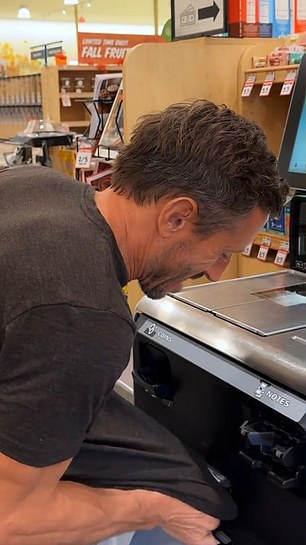A doctor warns consumers to avoid paper receipts because they contain carcinogenic chemicals.
Dr. Paul Saladino, a holistic doctor who goes by Carnivore MD, posted a video on TikTok earlier this week showing himself avoiding picking up a paper receipt at a grocery store.
In it videowhich has 3.6 million views, Dr. Saladino warns that ‘thermal paper receipts’ have a chemical layer on the surface that may contain BPA and BPS, industrial chemicals used to make hard plastics and synthetic clothing, which the body can absorb through the skin.
Dr Saladino said: ‘These are endocrine disrupting chemicals that can actually be absorbed through the skin.
“Touching one once in a while at the supermarket isn’t the end of the world, but I’d like to avoid as many endocrine disruptors in my life, thank you, as I can.”
Endocrine disruptors mimic the body’s hormones and interfere with the production and response to normal natural hormones such as estrogen and testosterone.
Research has linked them to infertility, longer menstrual cycles, erectile dysfunction, and some forms of cancer.
While Dr. Saladino faced a number of criticisms on TikTok, recent studies have suggested that up to eight in 10 paper receipts could contain chemicals, and experts recommend avoiding touching receipts if possible.

Dr. Paul Saladino, a holistic medicine doctor in California, posted a video on TikTok earlier this week showing himself avoiding picking up a paper receipt at a grocery store due to endocrine-disrupting chemicals.

Recent research suggests that eight out of 10 store receipts contain BPA and BPS (file image)
While recent research suggests that BPA and BPS may be present in most store receipts, it is still unclear how much exposure to BPA and BPS these receipts carry.
A study last year by the nonprofit Ecology Center found that 80 percent of receipts from 144 major U.S. chains in 22 states contained BPA and BPS. The chains included Walmart and McDonald’s.
Melissa Cooper Sargent, environmental health advocate at the Ecology Center, said at the time of publication: ‘Receipts are a common exposure route for hormone-disrupting bisphenols that are easily absorbed through the skin.
‘Our studies show that the majority of retailers use bisphenol-coated receipt paper.
“Switching to non-toxic paper is an easy change.”
The Environmental Protection Agency (EPA) has also stated that it is looking for “functional alternatives” to thermal paper.
BPA (bisphenol A) is an industrial chemical used in hard plastics and resins to make them more durable.
In a recent review, researchers found that BPA exposure in women can lead to a decrease in egg development and quality.
There was also an increased risk of implantation failure, when fertilized eggs do not implant properly in the lining of the uterus, often resulting in pregnancy loss.
Polycystic ovary syndrome (PCOS), a major contributor to infertility and a risk factor for endometrial cancer and diabetes, has also been linked to BPA exposure.
Additionally, these harmful substances can cause longer menstrual cycles and an earlier onset of puberty, which has been linked to depression, substance abuse, and breast cancer in adults.
The researchers also looked at the effect of endocrine disruptors on male sexual health.
They discovered that these chemicals decreased semen quality and caused malformations in the male reproductive tract, which reduced fertility.
Meanwhile, BPS (bisphenol S) is used to make hard plastic items and synthetic fibers in sports clothing.
The chemical has similar effects to BPA, according to a 2020 study published in the journal Nutrients BPS was found to be “more toxic to the reproductive system than BPA and was shown to hormonally promote certain breast cancers at the same rate as BPA.”
To reduce exposure, Dr. Saladino suggested not picking up the receipt or grabbing it with a sleeve or shirt and throwing it in the trash.
Receiving digital receipts via email or text messages is also an effective way to avoid thermal paper.
If you come across a receipt, you can check if it is thermal paper by scratching it with your fingernail. If the paper produces black marks when scratched, it is most likely thermal paper with a chemical coating.


